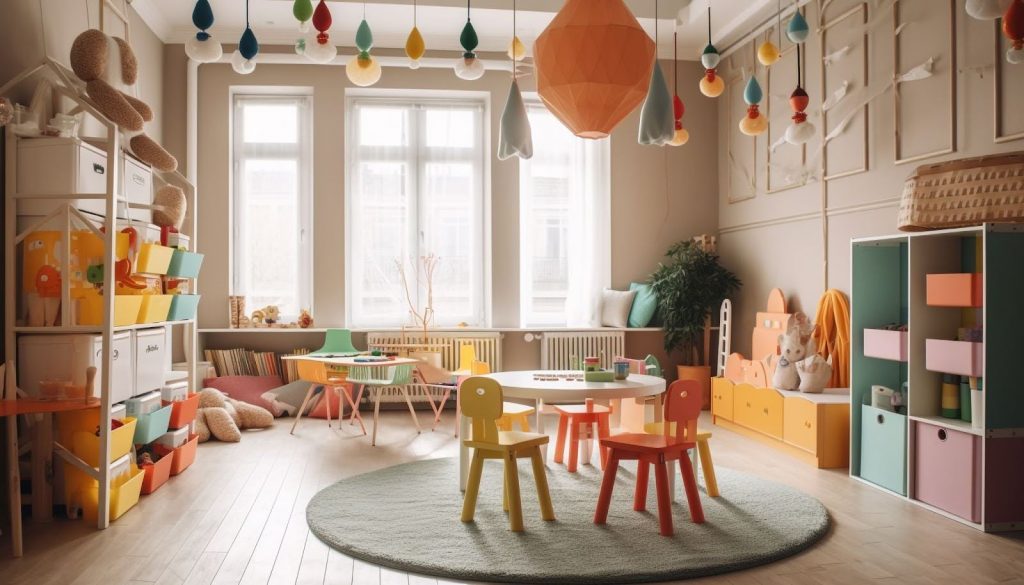If you are considering a career in the daycare industry, it is extremely beneficial to have somebody experienced to walk you through the nuances of your future workplace. Unfortunately, many employees who get a Kita job realize a significant mismatch between their expectations and the reality of their new profession. That is why we reached out to an expert who can help you see the insides of the industry.
Claudia Buntschu is a certified childcare expert, former Kita manager, and personal coach who has been in business for almost 30 years. In our extensive conversation, we discussed the essence of being a Kita manager, the skills required in the industry, and the career paths Kita jobs offer. On top of that, we distilled 4 things that you will be asked about during your job interview, so stay tuned!
Profession Kita Manager: What Is It About?

Source: Freepik
Claudia started her long and impressive career as a nurse in hospitals for disabled children and daycare centers. In 2005, she became a Kita manager, and the range of her responsibilities increased significantly. She was responsible for planning educational activities, managing personnel, and mentoring employees. Claudia also took part in the hiring and team-building processes, so she has plenty of priceless advice for those who only plan to enter the industry.
“As a certified mentor, I focus on developing a sense of community, feedback culture, encouraging and motivating employees based on their strengths and values.”
So, let’s start by looking at what motivates people to work in daycare and what skills Kitas and their managers want to find in the employees.
What Are Kitas Looking For in Their Employees?

Source: Freepik
This section will be extremely helpful for those who are getting ready to send out their resumes. Among other things, your resume is supposed to show what inspired you to get a Kita job and how your skills are relevant for the future position. And then, during the interview stage, you might be asked to elaborate on those aspects.
Motivation
Kita jobs have a lot of positives, but you can’t say they are easy. If your only motivation is to find a well-paid and convenient job, the employer might think that you are unprepared for the workplace challenges. Working with kids is a lot of responsibility, so you need to have a deeper source of motivation to back your application.
“I really enjoyed working with children and being around people, and that is where my desire to work in a Kita originated. I was considering other places, for example, hospitals, but eventually, I chose a daycare center because it allowed more creativity.”

Source: Freepik
As you can see, the desire to work with kids is paramount. But except for that, here are a few other talking points you could use during your interview:
- You want to achieve social change
- Seeing children learn and grow is rewarding
- Your workplace appreciates creativity
Remember that convincing a recruiter that your passion is genuine is one of the biggest achievements of the interview stage. The recruiter will then perceive you as a reliable person who will take childcare duties seriously and will be willing to continue working with a Kita after the internship.
“It took me a long time to find people who fit well with the team, people who were truly motivated to work.”
Skills
Skills that are relevant for your future workplace can be split into hard and soft skills. Hard skills are specific, teachable abilities gained through education, training, or experience. One good example of an essential hard skill is first aid. Soft skills are personality qualities that influence the way you communicate with other people, and that is what we focus on, in this article.

Source: Freepik
Classic examples of soft skills are communication and empathy. They are good but very common and will not help your resume stand out. So, you might consider adding at least one or two more specific points, like active listening or conflict resolution. Claudia also mentioned a few more important qualities:
“The qualities I consider extremely important, and often lacking today, include a healthy level of self-esteem and ability to self-reflect when receiving feedback.”
Healthy self-esteem is one of the most important determinants of effective social interaction in the workplace that translates directly into better decision-making, productivity, and work satisfaction. The ability to give and receive feedback is also crucial, and we’ll discuss it in the section about the Kita job interviews.
Inside a Kita: What Should You Expect?

Source: Freepik
In this section, we’ll take a look at the responsibilities of Kita employees and the challenges they might face.
Responsibilities
First of all, work responsibilities within Kita depend on the role of an employee and their seniority. For example, interns are legally not allowed to work with children without the direct supervision of a childcare specialist. Here, we’ll outline the typical responsibilities of a childcare specialist (or FaBeKStands for Fachfrau/-mann Betreuung Kind in Swiss), which is the most common daycare vacancy on job search platforms.
- Organizing kids’ playtime and education
- Supporting children with their first socialization steps
- Monitoring children’s behavior and keeping track of educational milestones
- Communicating with parents and addressing their concerns
- Collaborating with other educators
Challenges

Source: Freepik
Daycare professions are indeed demanding, both mentally and physically. So, here are the most common challenges daycare employees face:
🧒 Looking after too many children
There is no shortage of childcare vacancies on the job market now because Kitas are struggling to keep up with the number of children they look after. Monitoring more than 10 kids simultaneously is a very difficult task that requires full concentration and lots of patience.
“When you have 12 children in a group, you can’t take on that level of responsibility for each child individually. Also, these days, much more attention is paid to administrative tasks, leaving even less time for children.”
🕖 Long working hours
Unfortunately, employees are often expected to work long shifts to accommodate parents’ work schedules. It can make daycare really exhausting, considering that the job is also physically demanding, involving lifting, carrying, and constant movement.
🤯 Meeting parents’ expectations
Communicating with parents can be tough. Sometimes, their expectations are unrealistic, and their dissatisfaction can put a lot of stress on Kitas’ employees. Managing parental expectations is an essential skill daycare workers master over time.
“Especially after the pandemic, the parents became more demanding. Today, the responsibilities daycare centers are taking on are sometimes those that should be handled by parents.”
What Can Be a Career Path of Daycare Specialist?

Source: Freepik
After you have started your career journey as an intern at a daycare center, it will take 3 to 4 years to become a licensed childcare specialist. During these years, your salary will increase significantly, and you will likely undertake more work responsibilities. In Claudia’s case, she continued her career in the field and became a manager of a daycare center. Later on, when she switched to personal coaching, her experience proved to be extremely valuable.
“My time in the daycare industry influenced my approach a lot. My job is to help people identify their struggles, goals, and aspirations. I’m not only focused on the surface issues but delve into the emotions and feelings of each individual.”
However, it is also relatively easy to transition from daycare to social work, where your experiences and pedagogical education will also be valid.
4 Things You Will Be Asked About on a Kita Job Interview

Source: Freepik
Finally, as a bonus, we selected 4 crucial aspects Claudia mentioned during our conversation that you will likely receive questions about during your future job interview.
- Personal ethics
Moral values are increasingly important for a daycare worker. This includes being kind, emphatic, and having a strong sense of duty.
“First of all, I want to see how an applicant behaves in a social context with other people.”
- Pedagogical knowledge
While the minimal requirement to get an internship in a Kita is a complete secondary education, pedagogical knowledge and understanding of communication principles are greatly appreciated.
“During job interviews, I always ask a set of questions to assess candidates’ pedagogical knowledge.”
- Ability to give and receive constructive feedback
Daycare work involves constant learning and improvement, especially when you just started in the field. Giving and reflecting on constructive feedback helps maintain a healthy work environment.
“During the interviews, I want to understand how well can a candidate reflect on and provide feedback to other people.”
- Ability to work in a team
In most cases, a group of children is managed by more than one person, so daycare employees need to ensure that internal communication is effective and responsibilities are clearly divided.
“One of my duties was to help build trust between employees. If there’s no trust, developing a sense of community and teamwork becomes very difficult.”

Source: Freepik
These 4 aspects are truly important, and we highly recommend spending some time beforehand to prepare for related questions. But, of course, your interview won’t be limited to only several categories of questions. Claudia also shared an extended list of characteristics you should consider putting on your resume. On top of the things we have already discussed, it includes:
- Resilience
- Flexibility
- Observation skills
- Willingness to continue further training
Summary
In this article, we provide you with an insider look into the daycare industry. Thanks to Claudia Buntschu, an experienced Kita manager and personal coach, you know what motivations and skills make you a suitable candidate for a Kita vacancy. We also looked at the challenges you need to prepare for, and the career paths you can take. Finally, there are 4 essential aspects you might get asked about during your job interview, so we recommend checking them out, too!
Thank you for reading! We hope the insights we gathered will help you realize your inspirations in the daycare industry!
FAQ
❓ What Questions Will You Be Asked During a Kita Job Interview?
During your job interview, Kita recruiter will probably ask you about these 4 aspects: your moral principles, pedagogical knowledge, ability to give and receive feedback, and teamwork skills.
🤝 What Are the Responsibilities of a Daycare Specialist?
Responsibilities of a daycare specialist include organizing kids’ activities, helping children socialize, monitoring their behavior, and communicating with parents.
💸 Are Kita Jobs Well-Paid?
On average, the annual salary of a childhood educator in Switzerland is close to CHF 58,000, but a lot depends on your tenure.
✅ What Are the Requirements to Apply for a Kita Job?
The baseline for getting any Kita job is a solid level of German (B2 at minimum) and a complete secondary education.
